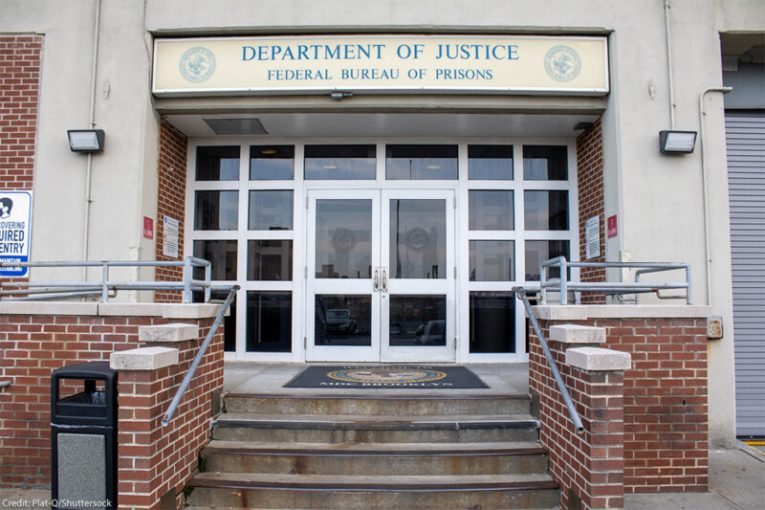

Three years after President Biden ordered federal agencies to end prison profiteering, the Marshals Service continues to sidestep the ban.
By Kyle Virgien and Nina Patel
At the onset of President Biden’s term, in January 2021, he issued an executive order to phase out the federal criminal system’s use of for-profit prisons. This was an important step toward stemming the flow of federal money to corporations that lock people up for profit. The executive order covered both the Federal Bureau of Prisons, which holds people convicted of crimes, and the U.S. Marshals Service, which holds people while they await trial or await transfer to a federal prison after sentencing. However, it left out the federal government’s heavy use of for-profit immigration detention facilities, which are rife with abuse, unsanitary conditions, and overcrowding.
The Bureau of Prisons followed the executive order and has closed all of its for-profit prisons. The Marshals Service has not. An ACLU analysis of documents produced in response to a Freedom of  Information Act request shows that, despite the executive order, the Marshals Service continues to hold nearly a third of its entire detention population in for-profit facilities, totaling 20,000 people. It does this by exploiting two loopholes it has created that undermine the purpose of the executive order: to end prison profiteering.
Information Act request shows that, despite the executive order, the Marshals Service continues to hold nearly a third of its entire detention population in for-profit facilities, totaling 20,000 people. It does this by exploiting two loopholes it has created that undermine the purpose of the executive order: to end prison profiteering.
First, the Marshals Service has obtained repeated waivers from the White House that allow it to ignore the executive order and keep five for-profit facilities open. The Marshals Service and White House have not publicized these waivers, and when internal government investigators asked for documentation of these waivers, they were “told that no such documentation existed.”
Second, the Marshals Service has determined that it can continue to pay corporations to operate detention facilities for profit, so long as it uses a city or county government as a middleman. Under this arrangement, known as a “pass-through” agreement, the Marshals Service pays a city or county government, which keeps a portion of the payment and passes along most of the payment to the corporation that runs the facility. An internal government investigation found that these agreements cost the Marshals Service more and provide less control and oversight over operations at its detention facilities.
By using these two loopholes to keep funneling money to corporations that profit from incarceration, the Marshals Service perpetuates the harm that these corporations cause. In the words of President Biden’s domestic policy advisor: “Private prisons profiteer off federal prisoners and are proven to be, or found to be by the Department of Justice inspector general, less safe for correctional officers and prisoners.”
A statistical analysis has shown that as states turn more to for-profit prisons, their incarceration rates increase. This should come as no surprise: for-profit prison companies use the taxpayer money they receive to lobby extensively for increased incarceration. The two largest for-profit prison companies spent $1.7 million and $1.3 million lobbying the federal government alone, with more money going to state lobbying. This does not include the for-profit prison industry’s significant donations to political campaigns and PACs. For example, these two companies each spent a quarter million on President Trump’s 2017 inauguration festivities, and one donated $225,000 to a pro-Trump super PAC.
Congress has taken notice. Nine senators wrote a letter to “express deep concern that the [Marshals Service] appears to be circumventing President Biden’s Executive Order.”
There are a few concrete steps that the Biden administration and the Marshals Service can take now to address these problems and plan for an orderly transition away from for-profit prison companies. First and foremost, they should work together to divert people away from pre-trial detention in a way that protects community safety and ensures people show up for their trials. With fewer people to detain, the Marshals Service will have less need to pay for-profit facilities.
The Biden administration and Marshals Service should also work to find viable alternatives to for-profit facilities for those who remain in detention, where people can be held near their families, friends, and lawyers. People have a right to confer with their attorney regularly to prepare a defense, and numerous studies show that proximity to loved ones and support networks supports better outcomes when people are released from custody.
As they do this, they should be transparent. The Marshals Service should publish its plan to close the five for-profit prisons with which it continues to directly contract. It should develop a plan to stop using pass-through intergovernmental agreements and publish a plan to phase out these detention facilities as well. Spending taxpayer dollars to enrich private corporations and shareholders who run facilities with abusive practices, poor medical care, and unsanitary conditions is a policy that harms incarcerated individuals and creates unsafe working conditions for correctional officers. The Biden administration has called for an end to this policy, it is past time for the Marshals Service to listen.
Kyle Virgien, Senior Staff Attorney, National Prison Project
Nina Patel, Senior Policy Counsel, ACLU
